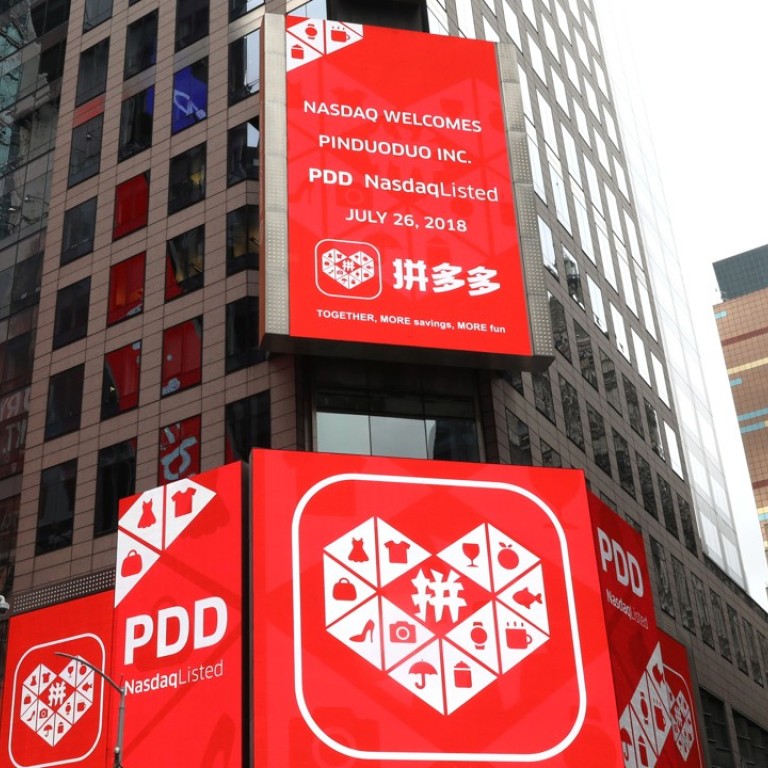
Pinduoduo soars in Nasdaq debut in affirmation of China’s social+ internet commerce model
Pinduoduo is the third-largest e-commerce company in China with 5.2 per cent market share, lagging behind leader Alibaba
Chinese e-commerce site Pinduoduo soared on its first day of trading in New York, valuing the company at nearly US$30 billion and making founder Colin Huang one of China’s richest people.
Pinduoduo rose as much as 44 per cent on its trading debut after raising US$1.63 billion in the fourth-largest US initial public offering this year. That contrasted with smartphone maker Xiaomi, which saw its shares slide 1.2 per cent in Hong Kong on its trading debut earlier this month.
The strong trading start for Pinduoduo comes after shares of Facebook slumped after missing projections, raising concerns that social media has peaked.
Pinduoduo is the third-largest e-commerce company with 5.2 per cent market share in China, lagging behind leader Alibaba Group with 58.2 per cent and JD.com at 16.3 per cent, according to research data by eMarketer. The company has amassed about 295 million daily active users as of the first quarter of 2018, and in 2017 recorded a total of 4.3 billion orders on its mobile platform and over 1 million active merchants.
“Pinduoduo is poised to take advantage of the growing Chinese e-commerce market along with China’s rapidly growing middle class,” Eleanor Creagh, a market strategist with Saxo Bank, wrote in a note. “As lower-tier cities become larger and wealthier, they will inject further consumption potential into the economy.”
Founded in late 2015, Pinduoduo, whose name loosely translates to mean “buy more together”, exists as a mobile app and a mini-program on messaging app WeChat that offers users generous discounts if they and at least one of their WeChat friends decide to purchase an item together.
Many of Pinduoduo’s items are offered at less than 10 yuan after discounts, making it especially appealing to users from less-developed areas where incomes are lower. These users tend to view e-commerce shopping with friends as a form of cheap and fun entertainment in a country where smartphone users total 717 million.
Its social+ group buying business model has proven so popular that Alibaba, which owns the Post, and JD.com have launched similar versions on their online marketplaces. For the year ended March 31, Pinduoduo sold merchandise with a total value of 198.7 billion yuan.
Pinduoduo founder Colin Huang became China’s 12th richest person with the soaring US trading debut. The former Google engineer’s US$13.8 billion fortune after the IPO places him among the world’s 100 richest people, according to the Bloomberg Billionaires Index. Huang retains a 46.8 per cent stake after the IPO, before any exercise of an over-allotment option.
Huang, who started his career at Google’s headquarters in 2004 as a software engineer, returned to China in 2006 to help establish Google China. He started his first company in 2007, an e-commerce site called Ouku.com that he sold three years later. At Pinduoduo, his Shanghai-based firm won the backing of Sequoia Capital and social networking giant Tencent.
In its prospectus, Pinduoduo said that it generates revenue primarily by providing “online marketplace services” to merchants, and will strive to improving recommendation features, developing innovative marketing services, and improving the measurement tools available to merchants
“Our number of active buyers, annual spending per active buyer and average monthly active users have been increasing … primarily been driven by the growing popularity and recognition of our brand and platform, the consumer preferences for our innovative shopping experience, wide selection and attractive prices of merchandise offered on our platform, and the positive impact of our promotional and marketing campaigns,” the company said in its prospectus.
Pinduoduo is banking on economies of scale to improve operational efficiencies over time, where a large selection of merchandise will help attract a bigger number of buyers that in turn drives sales volume and attracts more merchants to the platform. The massive amounts of data Pinduoduo collects on consumer preferences will also be offered as insights to merchants, as part of its online market services, Pinduoduo said.
Despite its phenomenal growth and 1.7 billion yuan in revenues in 2017, Pinduoduo is still unprofitable, posting a net loss of 499 million yuan for the 12 months ended December 31.
Pinduoduo has increased its spending on marketing in its attempts to expand its user base, including taking up prime television advertising spots during the 2018 Fifa World Cup. In the year ended December 31, sales and marketing expenses surged almost 800 per cent to 1.3 billion yuan.
Huang, who grew up in Hangzhou and studied at Zhejiang University, got a master’s degree in computer science from the University of Wisconsin. He plans to donate some of his Pinduoduo shares to two charitable foundations that he intends to establish.


